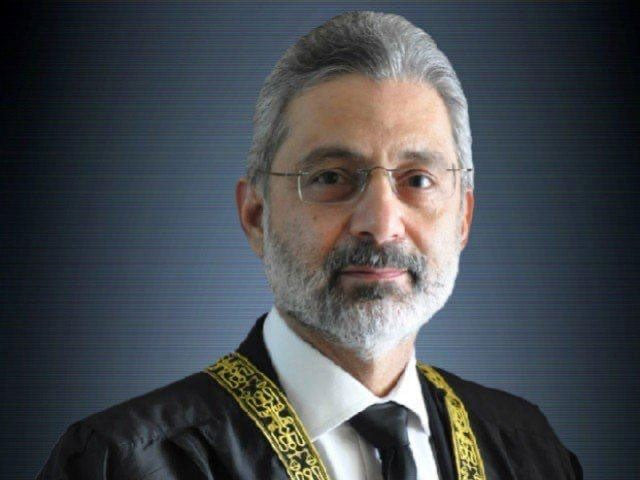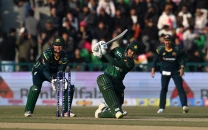SCBA for considering public perception in Isa case
Say non-inclusion of dissenting judges could be seen as silencing of dissenting voices

The Supreme Court Bar Association (SCBA) has contended that if a bench – not including dissenting judges – heard the review petitions in Justice Qazi Faez Isa case then such adjudication would give rise to a perception that the dissident judicial voices are being silenced.
"This naturally raises questions of transparency and impartiality, whether well-founded or ill-founded. Transparency and impartiality occupy a central place in the adjudicative arena,” said SCBA President Lateef Afridi in his written arguments submitted to the Supreme Court.
The written arguments were presented in connection with applications seeking formation of full-court to hear appeals against the apex court June 19 order. A six-judge larger bench led by Justice Umar Ata Bandial has already reserved its judgment with regard to formation of a full-court in Justice Isa case.
A number of petitioners challenged a split order delivered by a Supreme Court ten-judge bench on June 19 on petitions filed against a presidential reference that sought Justice Isa’s removal due to his failure to mention his family members’ foreign properties in his wealth statement.
Seven of the judges had referred the matter to the Federal Board of Revenue (FBR) for an inquiry. The FBR was directed to submit its findings to the Supreme Judicial Council (SJC) which could revive the reference. The SJC is the forum that can hold superior court judges accountable.
In order to hear review petitions against the judgment, the chief justice formed a seven-judge bench comprising all the judges who wrote the majority judgment. One of the members, Justice Faisal Arab, retired on November 3 and later another bench was announced comprising the remaining six judges.
Three judges – Justice Maqbool Baqar, Justice Syed Mansoor Ali Shah and Justice Yahya Afridi – who held the minority view, were excluded from the larger bench.
Talking with reference to the CJ’s decision, the SCBA president stated that as the law stands, the court or the CJ has no discretion as far as the number of judges of the review bench is concerned because judgment/order of the majority is the judgment/order of the court.
“The chief justice of Pakistan does not have much discretion when the same judges are physically available and practice of the court is no different.
“However, if after reasonable efforts the presence of a judge/judges of the original bench cannot be ensured then exceptionally other judges could be made part of the review bench.”
He said the circumstances of every case might differ. However, in the present case all the judges are available except one judge, Justice Faisal Arab, who recently retired.
“Finally, in the case under examination, if the court does come to the conclusion that under the circumstances it has discretion then that discretion in a case like this ought to be used where it “does most credit to the nation," SCBA concluded.
Afridi said the court must keep in mind the very real public perception of dissident judicial voices being silenced as well as the fact eyes of the entire nation are on this court.
"This court must decide with respect to the exercise of its judicial discretion – if the fate of the constitution of the bench hinges on it – an answer to the question: “Which conception does most credit to the nation.”
He said not making at least three dissenting judges part of the review bench is actually denying Justice Isa the right of actually having a chance of the decision being recalled or overturned in the review.
"For instance if the original bench is constituted in present case and at least 3 judges in the majority opinion decides to change their view in favour of the petitioner then original judgment can be recalled However, with the current constitution of the bench it has no chance of happening.”
He said the current constitution of the bench puts the petitioners at a disadvantage from the beginning and hence violative of his/her right to fair trial.
"The court should not always think about the perception of the court and keep in mind what is the public’s perception but the court should certainly be mindful of the fact that if it can improve or avoid damaging the perception of justice in public through its decision then it should especially in matters where it has a choice and not where strict application of law is required."
He said the phrase justice must be seen to be done does matter in every justice system especially in such a high profile case as this where the whole nation and the whole legal community’s eyes are on it.
“Therefore, this court or the Hon’ble chief justice when faced with the exercise of discretion as opposed to strict application of law, meaning there is hardly any discretion, then the discretion must be exercised in the favour of the interpretation that enhances the good perception of our justice system in the eyes of nation and the legal community.”
He said it is vital to clarify here that perception of our justice system is based primarily on two things –perception of the courts and perception of the law. Negative perception of the court, resulting in lack of public trust, does more damage to the justice system than negative perception of the law.
“For example where the court has discretion to interpret certain law or rules then it must do so in a way that enhances the perception of the justice system especially when the decision will improve perception of the court.
“However, if the court is strictly bound to apply law and has no discretion in it whatsoever then it can completely disregard the perception and apply the law because when a law requires strictly application then it is not the perception of the court but perception of that particular law that primarily is undermined and it can be rectified through better legislation in the parliament," the SCBA official said.
SCBA President Lateef Afridi was assisted by Barrister Sarwar M Shah, who had acted as law clerk of former CJ Asif Saeed Khosa.



















COMMENTS
Comments are moderated and generally will be posted if they are on-topic and not abusive.
For more information, please see our Comments FAQ